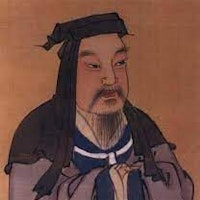The Spring and Autumn Annals examines the principles of things and rectifies their names. It applies names to things as they really are…
Tung Chung-Shu

To Rectify the Names
Topic: Society & Civil Religion
The Spring and Autumn Annals examines the principles of things and rectifies their names. It applies names to things as they really are… Such is the care of the Sage to rectify names, he said, “With regard to his speech, the superior man does not take it lightly.”
Tung Chung-shu (179-104 BCE) was a Chinese philosopher and scholar who played a major role in the development of Confucianism. He was born in Guangchuan, China, and was educated in the Confucian classics. He entered the imperial service during the reign of the Emperor Jing of Han and rose to high office under the Emperor Wu of Han.
Tung was a strong advocate of Confucianism, and he argued that it should be the official ideology of the Chinese state. In 136 BCE, his arguments were successful, and Confucianism became the official state religion of China.
Tung's most important work was the Luxuriant Dew of the Spring and Autumn Annals, a collection of essays on Confucian philosophy and political theory. In this work, Tung developed a comprehensive theory of the universe, society, and government. He argued that the universe is governed by the principle of tianming, or the Mandate of Heaven. This mandate is bestowed on those who rule in accordance with the will of Heaven. If a ruler fails to rule in accordance with the will of Heaven, he will lose the mandate and be overthrown.
Tung also argued that the ideal society is one that is based on the principles of ren (humanity) and li (ritual). Ren is the love of all people, and li is the proper conduct of oneself in society. A society based on these principles will be harmonious and prosperous.
Tung Chung-shu's ideas had a profound influence on Chinese society and government for centuries. His work helped to shape the development of Confucianism into the dominant ideology of China. His ideas are still studied and debated today.
Luxuriant Gems of the Spring and Autumn Annals
Chan, Wing-Tsit. A Source Book in Chinese Philosophy. Princeton University Press, 1969, [Tung Chung-Shu, Luxuriant Gems of the Spring and Autumn Annals].

Tung Chung-Shu
Theme: Wisdom
Resources
Copyright © 2017 – 2025 LuminaryQuotes.com About Us

Luxuriant Gems of the Spring and Autumn Annals
The quote above is from Tung Chung-Shu’s commentary on The Spring and Autumn Annals by Confucius:
Dr. Anthony Daniels, Worldview
A small change in locution illustrates a change in the character and conceptions of a people…. One begins to see what Confucius meant when he said, 2,500 years ago, that the first thing to do to restore a state to health was to rectify the names – in other words, to call things by their right names rather than by euphemisms.
–Dr. Anthony Daniels [The Worldview that Makes the Underclass, (Imprimis, May-June 2014)].
Wing-tsit Chan, Scriptures and the guidance of language
The Confucians place the highest priority on working toward an actual social harmony, which makes the pragmatically helpful aspect of guidance its most important aspect, but it should be noted that they are also very appreciative of the beautiful cognitive formation of li (rite, principle) and sagely models of excellence…. The sense of pragmatic religious guidance can be thought of as a gateway to expanded happiness….
The rectification of names was a common topic of discussion among ancient Chinese philosophical schools. Only in Hsün Tzu, however, did it develop into some sort of systematic logical theory. Whereas in other schools the interest is chiefly social or moral, in Hsün Tzu it is predominantly logical. In fact, this is the nearest approach to logic in ancient Chinese philosophy….
“Now the sage-kings are dead and the guarding of names has become lax, strange terms have arisen, and names and actualities have been confused. As the standard of right and wrong is not clear, even the guardians of law and the teachers of natural principles are in a state of confusion. Should a true king appear, he would certainly retain some old names and create new ones. This being the case, [1] the reason for having names, [2] the causes for the similarities and differences in names, and [3] the fundamental principles on which names are instituted, must be clearly understood.”
–Wing-Tsit Chan [A Source Book in Chinese Philosophy] p. 127 (The Hsün Tzu, Nature, On the Rectification of Names), p. 273 (Yin Yang Confucianism: Tung Chung-Shu)].